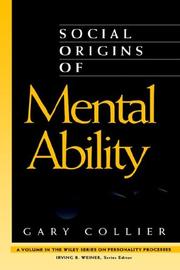Check nearby libraries
Buy this book

Over the past century many influential books and articles have appeared in which authors have offered "irrefutable" empirical evidence for the genetic origins of human intelligence. At the same time, unfortunately, nearly all that has been written in defense of the nurture side of the "nature vs. nurture" debate has been polemical in nature, concentrating mainly on shooting holes in the opposition's arguments.
Perhaps, then, Gary Collier's most outstanding achievement in authoring this defense of the social origins of mental ability is in offering a viable synthesis of supporting facts and ideas from the worlds of social psychology, the psychology of personality, and cognitive psychology. In so doing, he has done much to advance the nurture side of the debate
.
Social Origins of Mental Ability is divided into four interrelated parts. Part One provides a general overview within which the author examines some of the major controversies informing contemporary intelligence research. Some of these include debates about the nature and measurement of intelligence and the relative contribution of genetics and the environment.
Recent research into artificial intelligence is also discussed with particular attention being paid to the limitations of the use of computer models in the investigation of human intelligence.
Part Two delves into issues of the psychology of personality, including achievement motivation, locus of control, level of aspiration, and intrinsic motivation. Related areas, such as the fear of success, learned helplessness, resilient children, and self-handicapping strategies are also discussed.
Gender differences are stressed in the chapter devoted to achievement motivation, while the differences between blacks and whites are explored in discussions of locus of control, level of aspiration, and self-esteem.
Part Three reviews the research on the development of cognitive skills, beginning with the relationship between language and thought, and covering perception, memory, creative problem solving, and formal thought. It is argued that social conditions and previous experience shape every aspect of mental development, including the speed, breadth, and depth of human information processing.
In the fourth and final part of Social Origins of Mental Ability, the author examines the status of blacks in America and reviews the research on early childhood intervention and education reform. The book concludes with a general discussion of the social cost of nonintervention and what may happen if politicians and educators choose to do nothing.
The first comprehensive, systematic survey of research into the nonhereditary influences on intelligence, this book's impact will be felt beyond academe and the psychological community and is certain to have a profound influence upon the thinking of educators and policymakers in the years ahead.
Check nearby libraries
Buy this book

Previews available in: English
| Edition | Availability |
|---|---|
| 1 |
aaaa
|
Book Details
Edition Notes
Includes bibliographical references (p. 249-286) and indexes.
"A Wiley-Interscience publication."
Classifications
The Physical Object
ID Numbers
Community Reviews (0)
Feedback?| July 24, 2024 | Edited by MARC Bot | import existing book |
| March 27, 2018 | Edited by ImportBot | import new book |
| December 4, 2010 | Edited by Open Library Bot | Added subjects from MARC records. |
| April 28, 2010 | Edited by Open Library Bot | Linked existing covers to the work. |
| December 10, 2009 | Created by WorkBot | add works page |









